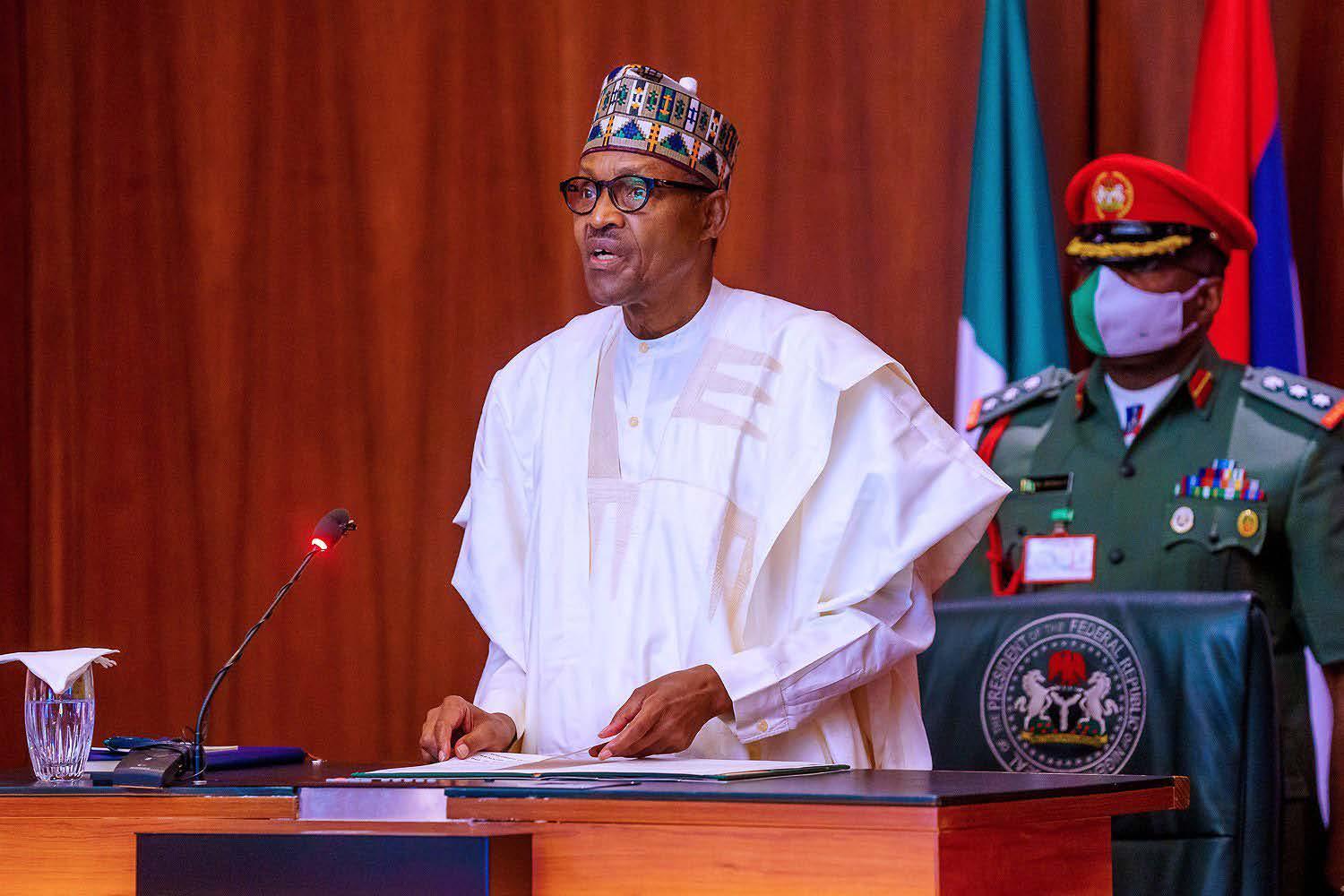
21 minute read
President Buhari Inaugurates Nigerian Content Tower, Pledges More Spend on Job Creation, Infrastructure
By Margaret Nongo-Okojokwu
...Jonathan, Senate President, ministers attend virtual commissioning
Advertisement
President Muhammadu Buhari Thursday commissioned the new headquarters building of the Nigerian Content Development and Monitoring Board (NCDMB) in Yenagoa, Bayelsa State, with a pledge to spend more on infrastructure across the country and focus on finishing projects delivered by local contractors and technology that create jobs for thousands of Nigerians.
The President commissioned the iconic 17-storey building known as the Nigerian Content Tower through the zoom meeting platform and was joined on the platform by former President Goodluck Jonathan, Senate President, Ahmed Lawan; Deputy Senate President, Ovie
Omo-Agege; three ministers, federal legislators, managing directors of international oil and gas companies and heads of government agencies.
Other structures commissioned by Mr. President included the 10MW Power Plant and 1000-seater Conference Center and he reaffirmed his administration’s drive to provide infrastructure across the country to attract investments, create jobs and eradicate poverty. ‘‘With the commissioning of this project, I want to highlight that we have put in place a landmark of reference in the Niger Delta to reflect long lasting legacies that signpost the years of oil and gas exploitation and I assure you that there is more to come,’’ he said. He expressed delight that thousands of direct and indirect jobs were created during the execution of the project in addition to the various business opportunities. ‘‘This commissioning brings to the fore the importance of local content in all activities of our national life especially with the prevailing COVID-19 pandemic. ‘‘I believe strongly in local production and patronage of our goods and services as one of the surest ways to empower our citizens and give them viable opportunities to excel in their chosen professions and business endeavors. ‘‘That is why two of the Executive Orders issued under our government are related to enforcing local content in public procurement and contracts
to further replicate the successes being realized in the oil and gas industry. ‘‘Local Content and Self Reliance are key principles of the recently approved 2.3 trillion Naira National Economic Sustainability Plan.
The plan is aimed at the promotion of local production, local services, local innovation, and the use of local materials,’’ he said.
Commending the Ministry of Petroleum Resources, the Minister of State for Petroleum Resources, Chief Timipre Sylva, members of the Governing Council, as well as management and staff of the NCDMB, for the achievement, the President said: ”The edifice we are commissioning today is a befitting birthday gift as you mark your 10thyear anniversary as a regulator and developer of local content in the oil and gas industry. ‘‘I am also pleased that this project has been delivered by local contractors supported by other local engineering and project consultants. We must all be proud that we finished what we started.
In his address, Chief Timipre Sylva described the building as evidence that Mr. President was committed to infrastructural development in every part of the country. ”It shows that skyscrapers and other laudable infrastructures can be built in the Niger Delta and indigenous contractors can perform wonders when given the right opportunities and the people of Bayelsa and indeed the entire Niger Delta are receptive to development and that Nigerian Content is here to stay.”
In his remarks, the Executive Secretary of NCDMB, Engr. Simbi Kesiye Wabote confirmed that the project was “fully executed using the dexterity of a Nigerian Architect, Popham Walter Odusote and other Nigerian consultants to design and supervise the project execution. The main contractor, MEGASTAR is Nigerian with several other Nigerian sub-contractors that worked day and night to deliver this world-class building with impressive safety statistics.”
According to him “the materials used is 76 percent Nigerian Content with the tiles, electrical cables, granite, and many other building materials produced in Nigeria. The manpower used for services and labor is over 95 percent Nigerian Content. The skills transferred to the local workforce in the construction of a high-rise building has been unprecedented.”
He expressed pride in the end-toend thinking that went into the design and execution of this project which is typical of the Nigerian Content Board. “That is why we also partnered with NAOC JV to provide the 10MW gas-fired Power Plant to provide reliable power supply to the new headquarters building,” he said.

Attendees of the event in Yenagoa included the Group Managing Director of the Nigerian National Petroleum Corporation (NNPC), Mr. Mele Kolo Kyari, who conveyed the support of the corporation to the NCDMB in the delivery of Local Content value to the nation.
In his speech, the Managing Director of Megastar Technical and Construction Company Limited, Architect Harcourt Adukeh stated that it was remarkable that a project awarded during the administration of former President Jonathan had continued seamlessly to completion and commissioning under the Buhari’s administration.
He commended NCDMB for having clarity of intent regarding what it wanted to achieve with the project. ”This clarity of intent and enthusiasm to develop Nigerian capacity engaged on this project was demonstrated seamlessly through corporate administration of four consecutive Executive Secretaries.”
He emphasised that the excellent t e c h n i c a l b a c k g r o u n d a n d experience of the current Executive Secretary helped ease the project, stressing that the project recorded a remarkable safety record, with zero Loss Time Injury (LTI), zero fatality, zero disability and zero road transport accident.
North/East Intervention: NCDMB Receives Report from Aisha Buhari Foundation
By Margaret Nongo-Okojokwu
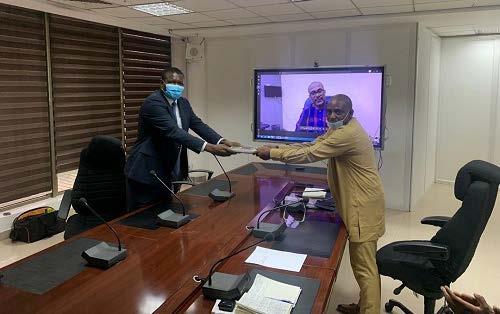
Th e N i g e r ia n C o n t e n t Development and Monitoring Board (NCDMB) recently received the implementation repor t on the school-based deworming programme it sponsored in Adamawa, Borno and Yobe States through the Aisha Buhari Foundation (ABF). The National Coordinator of the Foundation, Dr. Mohammed Kamal Abdurrahman submitted the report to the General Manager, Research, Strategy and Development (RSD), NCDMB, Mr.Abdulmalik Halilu at a brief ceremony at the Board’s liaison office in Abuja. The target of the Board’s support to ABF was to eradicate schistosomiasis, a neglected tropical disease amongst children between the ages of 5-11 years and to improve the nutritional status of pregnant women. The E xecutive Secretar y of NCDMB, Engr Simbi Kesiye Wabote participated in the meeting via the virtual platform and he remarked that the Board supported the programme because of the direct linkage between healthcare and nutrition of children and their mental development and contributions to the economy in their adulthood. He remarked that the Board’s intervention led to the donation of Folic Acid and Iron Supplements to 12,500 Pregnant Women and mass administration of Praziquantel Drug among school children for treatment of Schistosomiasis in Adamawa, Borno and Yobe States. A total of 243,776 children were administered the drug, with Adamawa having 100,778, Borno, 120,146 and Yobe 22,852. Wabote added that the programme also trained health workers in the three states, for sustainability and trained teachers in administration of the drug to school children for sustainability. Other accomplishments included the donation of 55,000 packs each of Ribena, toothpaste and toothbrushes to improve oral hygiene among pupils, development of a collaboration model and establishment of working relationship between the Board, the foundation, Federal Ministry of Health, World Health Organization (WHO) and State Ministries of Health on accessing logistics, training, communication and administration of drugs to combat Schistosomiasis on an ongoing basis. The National Coordinator of the Aisha Buhari Foundation thanked the Board for supporting the successful implementation of the programme He highlighted the multidimensional nature of the project, including the impact on children’s educational performance as well as the health benefits to school children, pregnant women and unborn babies. Abdurrahman also hinted that “the project has the potential to contribute to the attainment of many of the Sustainable Development Goals, particularly Goal 2, which speaks to the issue of nutrition; Goal 3, which has to do with promoting health and well being of all; Goal 4, which has to do with education and Sustainable Development Goal 17 which speaks to the issue
of partnership. ”In addition, this project aligns with national and global priorities as well.” Making a presentation, the Programme Manager, Dr Omole Ukwedeh revealed that the Board partnered ABF in 2018 with a view to supporting government’s efforts towards improving child survival in the North East. She clarified that Borno, Adamawa and Yobe were selected because they were the most affected by insurgency. She also explained that parasitic worms, Schistosomiasis and Soil Transmitted Helminthiasis are types of Neglected Tropical Diseases (NTDs) that are endemic in Nigeria, especially in the North East. According to her, these parasites have a detrimental impact on child health as they deplete nutrients in children and adversely affect physical and cognitive development, causing symptoms such as abdominal pain, anaemia, bladder and liver diseases.
”This results in impaired growth, reduced school attendance, poor educational achievement and reduced productivity as adults,” Ukwedeh added. Recalling their experiences while executing the programme, Ukwedeh said they were impacted by insurgency in Yobe State, reluctance of the populace to accept drugs in Borno state and communal clashes and difficulty to access some areas in Adamawa state. She pleaded with NCDMB to continue its support for the programme, adding that it was important to carry out follow up treatment for two consecutive years to achieve elimination of Schistosomiasis in target communities.
Oilserv, IVM Create Pedestal For Proliferation Of Locally Manufactured Vehicles
By Jerome Onoja
L-R: Engr Emeka Okwuosa (Chairman, Oilserv Group) and Chief Dr. Innoson Chukwuma (Chairman, IVM) on tour of IVM facility
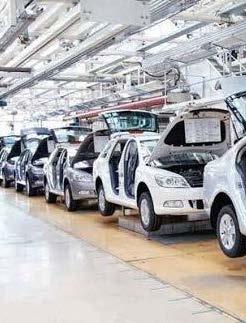
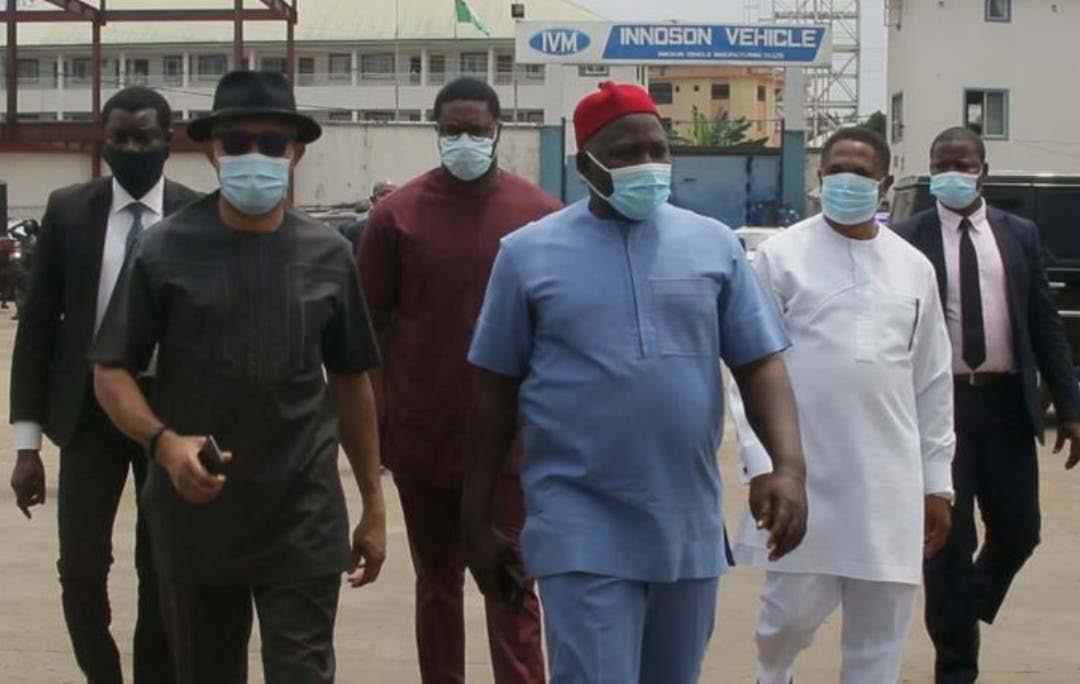
In furtherance of local content d e v e l o p m e n t , N i g e r i a ’ s engineering, procurement and construction (EPC) giant has announced its partnership with Innoson Vehicle Manufacturing as it intends to get involved in the conceptualization, manufacturing and use of the locallymanufactured vehicles for its oil and gas operations. This is geared toward eventual proliferation of Nigerianmade vehicles.
Sequel to its order for vehicles worth 600mn Naira (US $1.58mn), Engineer Emeka Okwuosa, Chairman of Oilserv Group recently led a team of some of his C-level executives on a tour of the IVM plant in Anambra state, where both companies announced their partnership in a bid to further entrench local content and increase the supply of locally-manufactured vehicles to Oilserv’s fleet and the Nigerian oil industry. The growth of Nigerian Content development in the oil industry is backed by the Nigeria Oil and Gas Industry Content Development Act (NOGICD Act) of 2010, a piece of legislation that was reinforced by the presidential Executive Order 003 and later Executive Order 005. All three instruments of the law point to the nation’s push for patronage of indigenous companies and growth of local capacity and capabilities.
Oilserv, a 100 per cent Nigerian-owned, EPC company with a commendable track record on big ticket projects within and outside the country has shown unwavering commitment in leading the development and expansion of Nigerian Content. Its strategic partnership with IVM is expected to spike the patronage and use of madein-Nigeria vehicles in the nation’s oil industry and beyond. Speaking to newsmen at the tour, Okwuosa said, “As an engineering and construction firm, we build pipelines in Nigeria and across Africa; we also develop and use technologies. But overtime, we have seen IVM prove itself because it doesn’t just talk the talk but also walks the walk, so we are here to identify with him.
“It’s important to note that IVM manufactures motor vehicles, they do not just assemble component parts. They take it from the scratch and adapt it to our country.
“So, we see their ingenuity as an avenue to forge a partnership.
As such, we are here to see their processes and to tell the world that IVM is developing Nigerian Content, of which Oilserv is a key driver.”
He further added, “IVM is a local manufacturer while Oilserv is a local engineering company. So this partnership with IVM is a testimony to the development of local capacity in Nigeria.
“We are here to partner with IVM for the conceptualization, manufacturing and use of local vehicles for our activities in the oil and gas industry.”
Confirming IVM’s competency over time, Okwuosa said, “We have been engaging Innoson before now because we believe in them. We already made an order worth about 600mn Naira. Some of the vehicles you saw during the tour are being made for Oilserv.
“It’s pertinent to note that you need to have high quality and standards to service the oil industry. I’m talking about international standards; the same that obtains in Western world. And that standard is what we see here.
“Another key feature with IVM is the flexibility of its manufacturing process. That gives you a wide range of options to explore.”
On his part, Dr Innocent Chukwuma, Chairman and Chief Executive Officer of IVM maintained his resolve to develop Nigerian Content and local supplies of its raw materials. He stated that IVM is unfazed in spite of the absence of a functional steel industry.
“Because we manufacture and do not just assemble, 60 per cent of our component parts come from within the country. Yes, it’s interesting to note that we make the carcasses of the vehicles here, locally. “ We only import some engines, electrical and body parts but we produce all the plastic component ourselves, he added.”
He further stated that, “new vehicles are produced according to demand. Whatever the need, we can build the mould and produce the specification.
“The partnership with Oilserv will help Nigeria as a whole, even across Africa. Because, wherever OIlserv works across Africa, it’ll be noted that the vehicles used are from Nigeria.
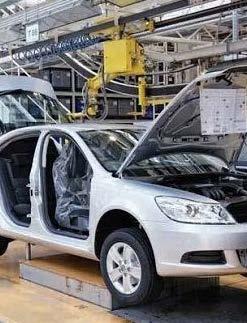
“Our vehicles constitute about 90 per cent of their fleet – locally manufactured! That tells you Mr Okwuosa has the development of Nigeria in mind.”
Alluding to a unique benefit from its partnership with Oilserv, Dr Chukwuma stated that, “even when they give us orders on certain specs, we still learn a thing or two from them because Oilserv is an outstanding engineering company with international footprint.
Confirming the standards with its manufacturing process, he affirmed that IVM’s manufacturing process is built to global standard. He said, “our vehicle manufacturing system is consistent with what obtains globally. There are international standards you have to meet, otherwise it won’t work. We maintain that same standard here.
“We don’t just manufacture to quality and standards, our delivery is also on scheduled time. I can attest to that fact that Oilserv is happy with our delivery time” he quipped.
Lending his voice to a major benefit of local content development and sourcing vehicles locally, the Group Head of its Supply Chain at Oilserv, Chukwuma Nkwodinmah praised the partnership between both firms.
Nk wodinmah said, “Sourcing vehicles locally has added to Oilserv’s profitability. A direct comparison between the prices of local supplies as against importation of similar vehicle specs shows a price differential. That difference is a huge profit to OIlserv.
“Also, our large orders help Innoson put food on the table of its large employees.
So, it’s a mutually-beneficial partnership with a lot of prospects”, he added.
In the same vein, Solomon Okodugha, Group Chief Finance Officer, Oilserv Group noted that the partnership is strategic to Oilserv, helping it further its pursuit of Nigerian Content development.
Okodugha averred that the partnership will lift jobless people off the street via employment by both companies, thus it’s a commendable venture which also improves the economic wellbeing of Nigerians.
Identifying a unique feature of the partnership, Chigozie Obi, General Manager Operations and Technical Services for OIlserv stated that,
“Both companies are champions of Nigerian Content and they are making a huge statement by showing Nigerians and the rest of the world that they can carry out technical activities and still maintain international standard”.
Azikel Modular Refinery In Bayelsa Progresses
By Margaret Nongo-Okojokwu
The Azikel refinery is a modular hydro-skimming petroleum refinery being developed in Yenagoa in Bayelsa state of Nigeria. It is the first private hydro-skimming refinery being developed in the country.
The refinery is being developed by Azikel Petroleum, a subsidiary of Azikel Group, which operates various businesses in Nigeria including dredging, air transportation, power, and petroleum. The new refinery will have a total production capacity of 12,000barrels per day (bpd). It will process Bonny Sweet light crude and Gbarain condensate to produce high quality petroleum products including a few secondary products.
Azikel refinery location and site details
The refinery is located in the Obunagha complex of the Gbarain region, near the city of Yenagoa in Bayelsa State. It is in close proximity to the shores of the Nun River towards the south, the GbarainUbie Shell gas gathering facility on the east, and the proposed Azikel power plant on the west. The refinery site covers an area of 19.9ha and is well-connected to road transport infrastructure by the East-West Road and the Issac Adako
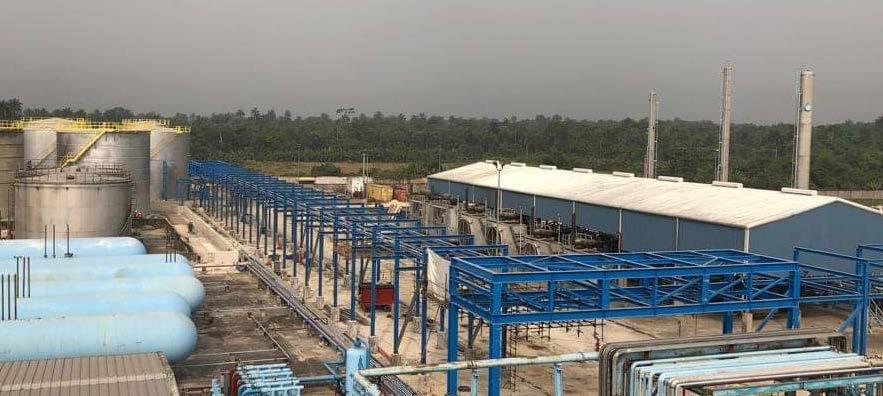
Boro Expressway that connects to Yenagoa and Port Harcourt.
Azikel refinery design details
The Azikel refinery development is divided into two segments – Outside Battery Limits (OSBL) and Inside Battery Limit (ISBL). The ISBL segment will include process units of different sizes, which are designed to produce mixed liquefied petroleum gas (LPG), gasoline, kerosene/Jet A1, diesel and heavy fuel oil products. It will comprise of a crude distillation unit with debutaniser, naphtha hydrotreater, naphtha splitter, catalytic reformer, diesel treater, isomerisation units, steam boilers and gasoline stabiliser. The OSBL segment includes an internal road network of 3.1km and total storage capacity of 665,700 barrels or 70,930m3 for crude and refined products with 32 units of different tank sizes. The area will also house a security building, maintenance building, administrative building, terminal operator building, vapour collection centre, fire-fighting station, loading gantry, water treatment and utilities. The refinery will receive feedstock from the nearby Gbarain-Ubie Shell facility through a pipeline to the storage tanks. The raw water consumption of the refinery will be 140 gallons per minute (gpm) and cooling water circulation will be 1,200gpm.
Azikel refinery development and construction details
The major engineering designs for the Azikel refinery were implemented in 2015 and the soft development of the project began during the same year. Infrastructural development works began in 2016 after receiving environmental and social impact assessment certificate followed by land acquisition and land preparation. The refinery site comprises of naturally thick virgin swamp forest, which required massive sand filling to enable construction. The land reclamation and sand filling works for the site required the use of 2.7 million cubic meters of sand over a period of nine months.
The detailed engineering works commenced in 2017 followed by the civil and mechanical works. Concrete perimeter fencing and construction of the internal road network commenced during the same year. Major works undertaken in 2018 included the construction of the storage tanks, administrative building, terminal operating building, and helipad apart from installation works for the main refinery.
Procurement and fabrication of the main modules including the crude distillation units, isomerisation units, and naphtha hydrotreater is currently ongoing.
Azikel refinery products
The primary products of the refinery will include premium motor spirit, diesel, kerosene, LPG and aviation fuel. The secondary products from the refinery will comprise of heavy fuel oil, naphtha, and gas oil.
Contractors involved
McDermott, an engineering and construction company, was awarded the engineering, procurement, and construction (EPC) contract for the ISBL segment of the refinery in July 2020. McDermott also worked on an extended front-end engineering and design (FEED) contract since 2018.
UAE’s MUC Oil and Gas undertook the project management consulting and FEED contract for the project. Other companies associated with the project include Honeywell UOP, Oil Project USA, JLS Capital Strategies, Shell, MRS, Norton Rose Fulbright, Atlantic Gulf and Pacific Company, and Chemie-Tech.
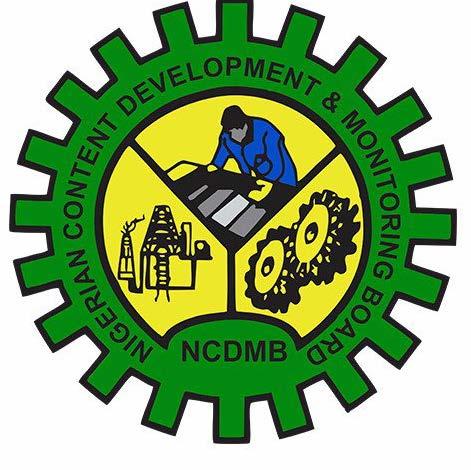
NCDMB in Equity Investments Agreements With Nigerian Based Firms
By Margaret Nongo-Okojokwu
Nigerian Content Development and Monitoring Board (NCDMB) has signed equity investment agreements with Duport Midstream Company.
The agreement will see the establishment of an energy park in Egbokor, in the country’s midwest and Eraskon Nigeria Limited, for lubricating oil blending plant in Gbarain, in Nigeria’s south-central east. The two companies are expected to
generate 1500 direct and indirect jobs.
The energy park will comprise of 2500 bpd modular refinery, 30mn standard cubic feet gas processing facility, a compressed natural gas facility and two megawatts power plant. The lubricating oil plant is expected to have a capacity for 45,000 litres per day.
Simbi Wabote, engineer and the executive secretary, said the investments were coming
under the board’s commercial ventures programme and are in sync with the vision to catalyse the industrialisation of the Nigerian oil and gas industry and its linkage sectors. He noted that the board was excited at the prospects of the partnerships in job creation, value retention petroleum products availability, utilisation of our abundant gas resources and in the development of incountry capability.
FG Begins Feasibility Study for Brass Shipyard Project NCDMB, NLNG to drive project By Margaret Nongo-Okojokwu
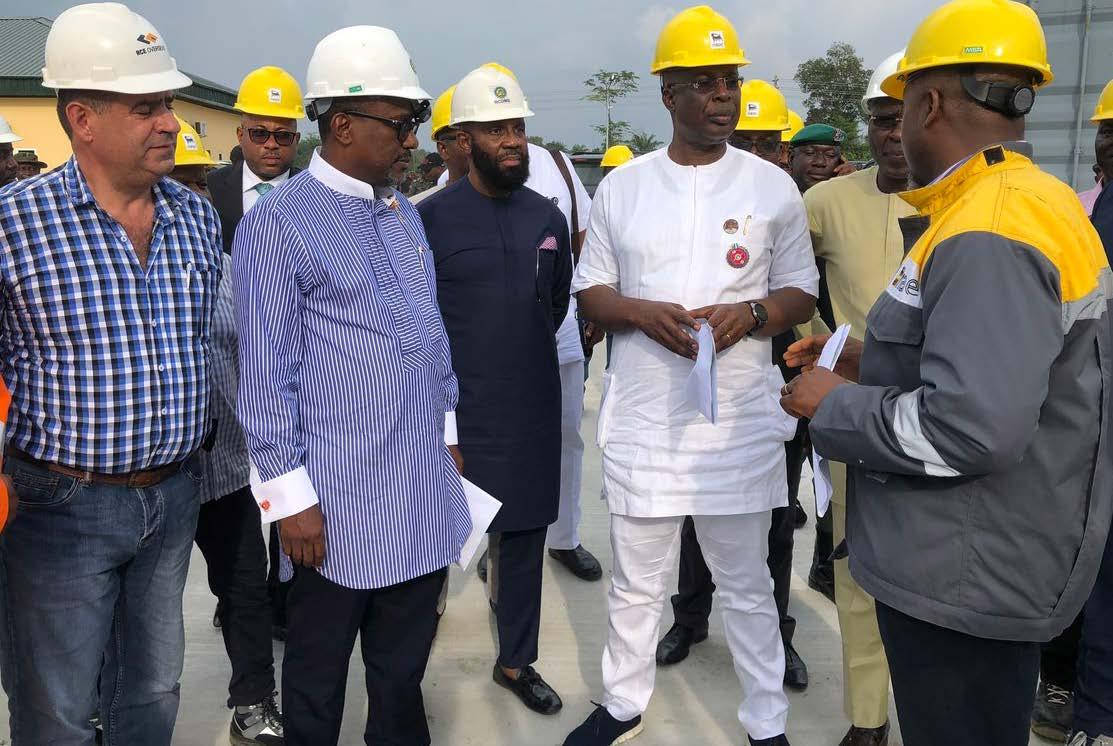
has commenced feasibility study for the construction of a shipyard in Brass Island, Bayelsa State, which would cater for the maintenance and repair services of cargo vessels, oil tankers, and LNG carriers. The Minister of State for Petrolem Resources, Chief Timipre chaired the project’s kick-off meeting on Thursday and stated that it will be executed by China Harbour Engineering Company, which had carried out similar projects across the globe as well as in Nigeria. The feasibility study will be funded by the Nigerian Content Development and Monitoring Board (NCDMB) as part of its overarching mandate to domicile key oil and gas industry infrastructure and increase retention of industry spend. The scope of the feasibility study includes geotechnical and bathymetric surveys, conducting a market study, ascertaining an optimal construction scale, developing technical proposal and construction plan and estimation of the required investment to bring the project into reality. According to the Minister, the high traffic of vessels in and out of Nigeria provides a huge opportunity to retain substantial value in-country through the provision of dry-dock services. He said the shipyard project would further develop and harness the nation’s position in the oil and gas value chain and linkage to other sectors of the economy. Dwelling on the prospects of the shipyard project, Sylva hinted that the Nigeria LNG’s Train 7 project is expected to increase the company’s Liquefied Natural Gas capacity from 22MTPA to 30MTPA and induce the acquisition of additional LNG carriers to the existing ones, all of which would need maintainance and servicing. He added that the project would also benefit from the upcoming implementation of the Africa Continental Free Trade Agreement (AfCFTA) as Nigeria could serve as hub for ship-building and repairs. He expressed confidence that the outcomes of the feasibility study and subsequent construction and operation of the shipyard will create employment opportunities and contribute to poverty reduction in line with the aspirations of President Muhammadu Buhari’s Government. In his presentation, the Executive Secretary of NCDMB, Engr. Simbi Kesiye Wabote assured the Brass shipyard project and other ongoing efforts to catalyze manufacturing would help the Board achieve the target of 70 percent Nigerian Content by 2027. He confirmed that the project was being driven by the NCDMB in conjunction with NLNG as a Capacity Development Initiative (CDI) on the back of the Train 7 Project. He mentioned that Nigeria has a long coastline of 853 kilometers and navigable inland waterways of 3,000 kilometers, which offer immense potential for maritime sector development, stressing that Brass coastline, was very close to the Atlantic Ocean. Wabote further explained that there ”are over 20,000 ships working for the oil and gas sector in Nigerian waters and the annual spend was over $600million in the upstream
The Federal Government
sector.” Providing more statistics, the Executive Secretary stated that the oil sector spent $3.047bn on marine vessels between year 2014-2018 and 73 percent of the total spend went to crew boats, security vessels, diving support vessels and fast supply intervention vessels. Other vessels in that category include mooring launch and shallow draft vessels, he said. He regretted that most of the vessels that operate in the oil industry are taken to Ghana, Equatorial Guinea, Cameroun and other countries for dry docking because our local dry docks were built many years ago and no longer provide the required services.
The Executive Secretary also listed the objectives of NCDMB’s Marine Vessel Strategy to include promotion of indigenous ownership, increase participation and increase capacity of local shipyards to build, service & maintain marine vessels of various sizes and manufacturing of vessel components and consumables incountry Other objectives of the Marine Strategy are to give first consideration to Nigerian built or owned vessels for contract award and job offers, discourage capital flight, generate employment and increase retention of Industry spends and stimulate value creation. The project’s schedule indicates that the site work would be executed within six months while feasibility study would be completed in four months.










